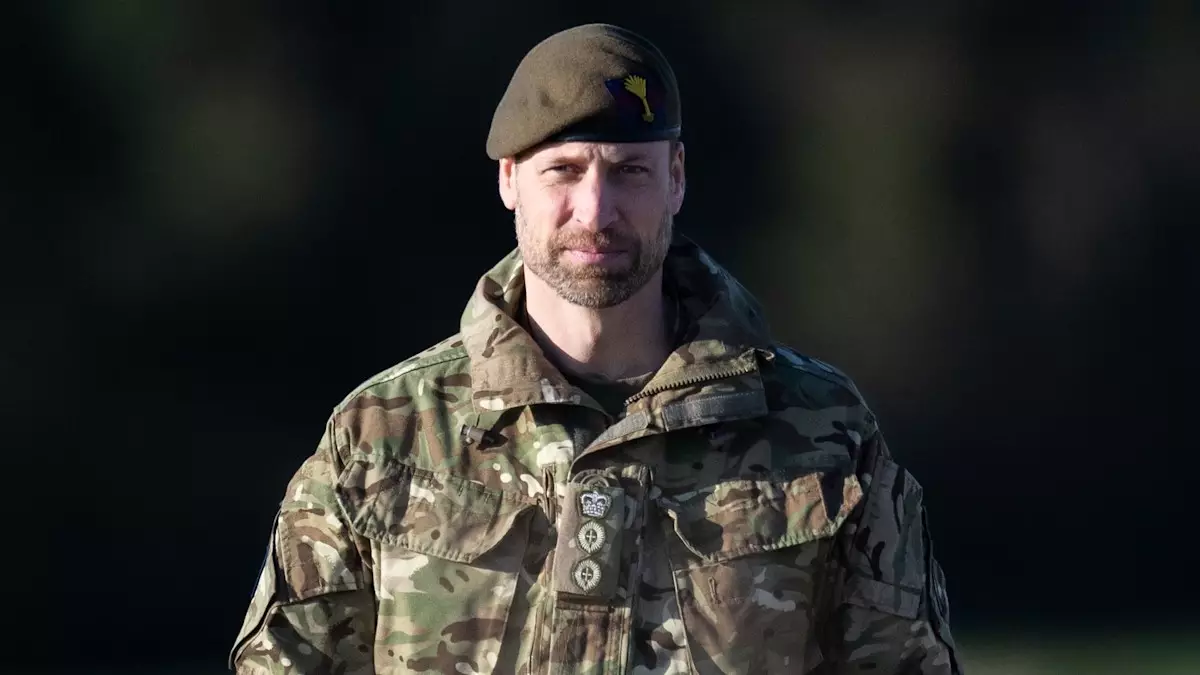On a bright Tuesday, Prince William, the Prince of Wales, underscored his deep-rooted connection and empathy for the British Armed Forces as he participated in military training exercises with the Welsh Guards on Salisbury Plain. The 42-year-old royal, who assumed the role of colonel of the regiment the previous year, donned a camouflage uniform, aligning himself with the troops as they engaged in live-fire practice. This moment not only highlighted his commitment to the military but also represented the transition of the 1st Battalion of the Welsh Guards from ceremonial duties back to essential military training, a move that reflects the changing dynamics of their responsibility in service.
Over the past couple of years, the Welsh Guards have been at the forefront of significant national events, including the state funeral of Queen Elizabeth II and King Charles’s coronation. As they prepare to transition back into traditional soldiering roles, the regiment is set to undergo extensive training to enhance their specialist weapons capabilities. The Prince’s presence at this training enforces a sense of continuity and underscores the importance of operational readiness, marking a distinct pivot from their recent ceremonial engagements.
During his visit, Prince William took time to connect with a six-member sniper team, illustrating his genuine interest in understanding the challenges and experiences faced by soldiers. His conversational approach was both respectful and light-hearted as he inquired whether the training was satisfactory and if the soldiers welcomed a break from their ceremonial obligations. His remarks about ensuring that his father, King Charles, doesn’t impose further duties on them speak to his awareness of the pressures these soldiers face, particularly following an extensive period of ceremonial service.
The Royal visit was appreciated by the soldiers, as it provided them an opportunity not only to showcase their skills but also to engage directly with a prominent figure who understands the weight of their responsibilities. A platoon commander articulated the significance of such visits for morale, emphasizing the long-standing relationship the regiment has had with the monarchy and how this connection boosts spirits. Interactions like these create a palpable bond between the royal family and the armed forces, reinforcing a shared sense of duty and honor.
One fascinating aspect of Prince William’s visit was his attempt to fly a military drone, an evident nod to the evolving nature of warfare, especially highlighted by its extensive use in the recent conflict in Ukraine. Drones have transformed the battlefield, offering new strategic insights and operational capabilities. By engaging with this modern military technology, Prince William not only demonstrates personal interest but also symbolizes the royal family’s recognition of contemporary military practices.
Moreover, his bearded appearance has garnered attention, as soldiers are now permitted to sport facial hair while serving in the British Army. The reception of his new look on social media shows how the modern royal family is evolving with public opinion, enhancing their relatability. The commentary from royal fans suggests a desire for a more contemporary representation of monarchy, which resonates with younger audiences familiar with a more casual royal image.
As Prince William’s military engagement winds down, Kensington Palace has announced that the Princess of Wales will step into the public eye, participating in the upcoming state visit of the Emir of Qatar. Together with her husband, William, they will welcome His Highness Sheikh Tamim bin Hamad Al Thani and Her Highness Sheikha Jawaher, illustrating the multifaceted responsibilities of the royal family. Such events encapsulate not only public diplomacy but also the modern role of the monarchy in fostering international relationships.
The Prince of Wales’s recent endeavors showcase a blend of duty, heritage, and modernity, highlighting his evolving role within the royal family and his continuing commitment to the armed services. His enthusiastic participation in military exercises serves as a reminder of the significance of these interactions, fostering a sense of unity and pride within the ranks of the soldiers. In a rapidly changing world, the ties between the monarchy and military remain a crucial element of British identity.

